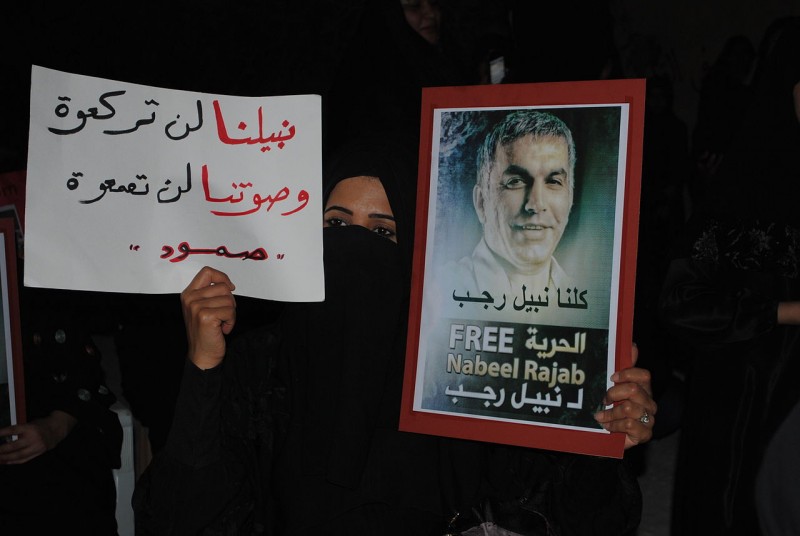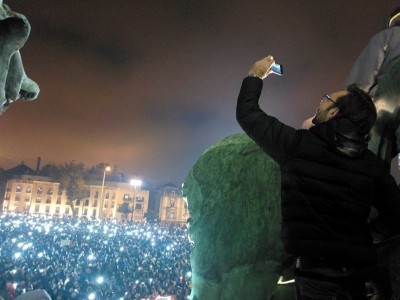Digital Citizen is a biweekly review of news, policy, and research on human rights and technology in the Arab World. Subscribe!
Bahrain
On 14 May, an appeals court upheld a six-month jail sentence against prominent human rights activist Nabeel Rajab over a tweet deemed insulting to the country's interior and defence ministries. In the tweet posted last September, Rajab accused the kingdom’s security institutions of serving as ‘the first ideological incubator’ for those joining the hardline militant group ISIS.
In a separate case, Rajab was arrested in early April for tweeting about torture of inmates at Jaw prison and criticizing the Saudi-led war in Yemen. On 11 May, Bahraini authorities extended Rajab’s pre-trial detention for two weeks.
In a rare order by Bahrain’s Court of Appeals, award-winning freelance photographer Ammar Abdulrassol was released on bail while he appeals his two-year sentence.
Egypt
A criminal court in Cairo extended the pre-trial detention of photojournalist Mahmoud Abou Zeid, known as Shawkan, for another 45 days. Shawkan has been in detention since August 2013, when he was arrested while covering clashes between Egyptian security forces and supporters of ousted president Mohammed Morsi for the citizen photography website Demotix.
Kuwait
Former MP Waleed al-Tabtabai was arrested on 1 May for alleging on Twitter that Iran is pressuring Kuwait to replace the crown prince with another one who has strong relations with Tehran. Tabtabai faces the accusations of spreading false news about the internal situation and undermining the status of the crown prince on social media.
Lebanon
“The Beirut Spring Festival“—created and launched in 2009 by the Samir Kassir Foundation—is inspired by the title of one of the last articles written by Samir Kassir, shortly before his assassination in 2005.
This event, targeting the broad general public, is unique both in its concept and program. In the first week of May, a panel discussion was organized on Freedom and Privacy: The Impossible Equation?, where two of Digital Citizen’s founders, Reem AlMasri and Mohamad Najem, shared their thoughts.
Morocco
The Moroccan Interior Ministry filed a lawsuit against a civil society group over a report that sheds light on the authorities’ surveillance of journalists and rights activists, reported state news agency MAP, without specifying the group. The 40-page report, entitled ‘Their Eyes on Me’, was published by Privacy International and their Moroccan partner, the Association for Digital Rights (ADN). ADN is assuming that the authorities are referring to them. On 5 May, authorities sought to prevent a press conference by ADN to present the report, from taking place at the headquarters of the Moroccan Association for Human Rights in the capital Rabat. Police officers reportedly surrounded the association’s headquarters to prevent journalists from attending the conference. The conference did eventually take place.
On 4 May, Hamid Mahdaoui, director of the news site badil.info stood trial over a report published on his site on the death of political activist Karim Lachkar in police custody. In a separate case, Mahdaoui stands accused of publishing false news and publishing an unlicensed newspaper over a news item on the explosion of a car in Meknes.
Qatar
Journalists from ARD and WDR—two public broadcasting networks in Germany—were arrested and interrogated by state security on 27 March while shooting a documentary critical of the 2022 FIFA World Cup in Qatar, it was revealed on 4 May. The Qatari authorities had also confiscated the journalists’ camera equipment, cell phones, and notebooks, and deleted all of their data. The journalists were released after 14 hours but their equipment was only returned to them after four weeks.
Saudi Arabia
A Saudi columnist has called for the filtering of Twitter, Facebook, and YouTube as the solution to terrorism, describing these sites as ‘satanic’. Mohammad Alshaikh, who is ironically on Twitter and has more than 120,000 followers, argues that filtering has been effective in preventing terror acts in China, despite the fact that 130 million Muslims live there. This column is but a reflection of the declining support for freedom of expression online in the Arab region, as a recent poll suggests.
Tunisia
On 7 May, a primary court sentenced in absentia Walid Zarrouk, former leader of the Union of Republican Security Forces, to one year in prison for criticizing a state prosecutor on Facebook. Zarrouk was found guilty of ‘disturbing others through public communication networks’ under article 86 of the country’s telecommunication code because of a 2013 post criticizing the politicization of prosecutions. In the same post, Zarrouk slammed former justice minister Noureddine Bhiri and the then-general prosecutor of Tunis, Tarek Chkioua. Zarrouk claimed that the court did not inform him or his lawyers of the trial date.
United Arab Emirates
Three sisters were released after spending three months in secret detention, for campaigning online for their imprisoned activist brother. Asma Khalifa al-Suwaidi, Mariam Khalifa al-Suwaidi and Alyaziyah Khalifa al-Suwaidi disappeared after they were summoned for questioning at a police station in Abu Dhabi on 15 February. According to Amnesty International, they were detained after tweeting about the unfair trial of their brother Dr. Issa al-Suwaidi, who is one of 69 government critics convicted for their activism in 2013.
Yemen
An official at the Houthi-controlled telecommunications authority denied reports of Internet shutdowns in Yemen, despite the fact that two major disruptions were already noted in the southern seaport city of Aden in early April. Another official in Aden accused Houthi rebels of damaging the cooling system of a central telecommunications base station and of spying on the communications of their opponents.
As the war opposing the Saudi-led coalition to Houthi rebels continues, journalists and human rights activists remain at risk, the Gulf Center for Human Rights said.
New research
- In a piece for Global Arab Network, Raied T. Shuqum writes on how social media is changing the face of the Arab world
- Writing for IFEX, Katie Moffatt asks: “Are hashtags for human rights hot air, or a powerful tool for change?”
- Digital Citizen contributor Courtney Radsch writes on how the Internet is being treated as an enemy in the Middle East
- The Arabic Network for Human Rights Information (ANHRI) released a report covering the state of Internet freedom in 11 Arab countries between mid-2012 and early 2015
- The Association for Freedom of Thought and Expression (AFTE) and ARTICLE 19 released a legal analysis of Egypt’s Telecommunication Regulation Law
In other news
- ‘Their Freedom Is Their Right': A campaign for prisoners of conscience in the Arab World
- BBC reports on Jordan’s e-Muftis battling ISIS online
- On AJ+, a Saudi LGBTQ blogger shares how he came under the scrutiny of the conservative kingdom’s cybersecurity machine
- Elle magazine published a profile of Enab Baladi, a women-run citizen media outlet covering the ongoing war in Syria
- To mark World Press Freedom Day on 3 May, DW Akademie launched a website featuring information about media freedom worldwide
- A programme focusing on the electronic documentation and protection of cultural heritage is digitising lost objects from Mosul Museum
From our partners
- Access and Global Voices were both signatories to a letter to Mark Zuckerberg, challenging the Facebook CEO to consider free expression and neutrality in implementing its Internet.org platform.
- EFF also criticized Facebook’s Internet.org, calling it “not neutral, not secure, and not the Internet”
Upcoming events
- IG MENA’s online training for internet governance is accepting applications
Digital Citizen is brought to you by Advox, Access, EFF, Social Media Exchange, and 7iber.com. This month’s report was researched, edited, and written by Afef Abrougui, Fahmi Albaheth, Mohamad Najem, Courtney Radsch, Thalia Rahme, and Jillian C. York and translated into Arabic by Mohamed ElGohary and French by Mahmoud Banhawi, Islam L. Khoufi, and Jillian C. York.




